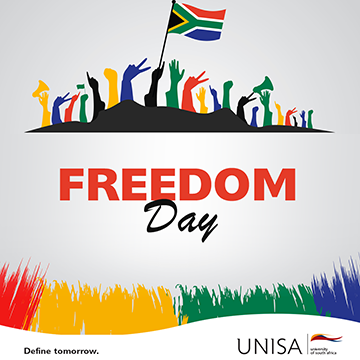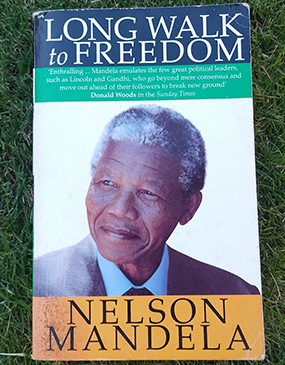News & Events
What to celebrate on Freedom Day?

One of the biggest things that aggravate me as a distance student and young professional planning to celebrate Freedom Day in 2022 is the picture of regression depicted by all media outlets. Young people like myself find it so hard to ignore every message that lacks progress in the transformation our country aspired to have had by now. But I would also like to highlight that Freedom Day remains pertinent, regardless of all the challenges we are faced with today.
We live in times where there are so many voices. Leaders are confident to change the status quo of our country and yet there is still so much to mourn. Crime, corruption, unemployment, poverty, femicide and gender-based violence are still issues reported daily on the news. The reported corruption during the pandemic answers why young people are quiet and no longer participate by making their voices being heard during voting times. Standing on the podium to deliver a message of hope is probably not easy, but first-hand experiences of injustices are the hardest.
However, for this year’s Freedom Day I am encouraged by our leaders’ writings to stay positive in observing this day. Freedom Day is an annual public holiday in South Africa celebrated on 27 April. The day embraces the freedom of black South Africans and commemorates the first post-apartheid elections held on the day in 1994. Seeing my parents taking pride to vote in 1994 on the specific day was remarkable. These are people who experienced apartheid first hand and know the value of being given the freedom to have a voice and a choice by putting a marked paper in the ballot paper.
Hence tomorrow is important for a young person like me. I choose to observe the day by reflecting on Long Walk to Freedom, Nelson Mandela’s autobiography. I believe that it is a book that should be kept in each South African household particularly for days like this.
This is one of the first books I bought for myself when I was working as a student worker at Unisa and I do not regret spending my little salary on it. Buying and reading books that educate, inform and entertain brings so much freedom in a young person’s life. The same freedom gives young people a powerful weapon to keep those in power in check by contesting their empty promises and lies. Voices are too many but by reading you can choose your own voice. That is freedom and challenging oneself to read is one thing among many other things young South Africans should embrace. Reading helps us to remember the injustices of our past. It encourages us to fight for what is right as a society based on democratic values.
In honouring those who suffered for justice and freedom in our country I feel respecting those who have worked to build and develop our country should be remembered through the stories they have told. Their voices should be recited like poems to bring society, religions, and communities together.
To this day I still remember the voice of mama Winnie Madikizela-Mandela in the ZK Matthews Great Hall roaring when her granddaughter was graduating. The granddaughter, Zoleka Mandela, took years to complete her qualification but because of the benefits of open, distance and eLearning she managed to summon the courage to go back to varsity parttime and complete her studies. Distance education is unique for that reason. It gives everyone the freedom to choose where to study and how to study. Taking years to complete a qualification is lonely but having the bravery to do it after years of either dropping out or failing is what Freedom Day stands for.

Nelson Mandela's Long Walk to Freedom
Imagine serving 27 years in prison shaping the story of your country through hardship, resilience, and ultimate triumph. The patience of fighting for what is required, and right, is a stunning account of what our leaders did for the country though their political tales today are saddening. As we wish them to do better, I wish to also point out that reading and education are the most powerful tools in a world prone to cynicism and classism. For distance students patience could mean registering one or two modules, an opportunity offered only at a distance university. Pace yourself and have the persistence to rewrite our country’s story through education.
In his book, Madiba said it that education is the great engine of personal development. He wrote: ‘It is through education that the daughter of a peasant can become a doctor, that the son of a mineworker can become the head of a mine, that the child of farmworkers can become the president of a great nation. It is what we make out of what we have, not what we are given, that separates one person from another.’
I am learning to celebrate Freedom Day through Madiba’s story. His writings give me my own liberation story. I pace myself to achieve in learning and growing as not only a parttime student but also as a young female professional, mother and child. Through Madiba’s story I learnt three important things:
Page 52: ‘Prison not only robs you of your freedom, but it also attempts to take away your identity. Everyone wears a uniform, eats the same food, follows the same schedule. It is by definition a purely authoritarian state that tolerates no independence or individuality.’
Page 69: ‘I never imagined the struggle would be either short or easy. The first few years on the island were difficult times both for the organisation outside and those of us in prison.’
Page 72: ‘It is easier to educate a man when he wants to learn. – when the warders asked Madiba in exasperation what he really wants to point a shelter and food. ‘I would then calmly explain our policies to warders. I wanted to demystify the ANC for them, to peel away their prejudices.’
As young people living in a world with too many voices and disruptors such as Covid-19, we should try to celebrate Freedom Day and remember courageous leaders who fought to attain equality, human dignity, privacy, citizenship, labour relations, healthcare, food, water, and social security among many other things they worked on. Even though we are not there yet, we should remember their zeal to build a healthy society.
*By Lesego Chiloane-Ravhudzulo, Journalist, Department of Institutional Advancement
Publish date: 2022-04-26 00:00:00.0

